Travellers' Tales
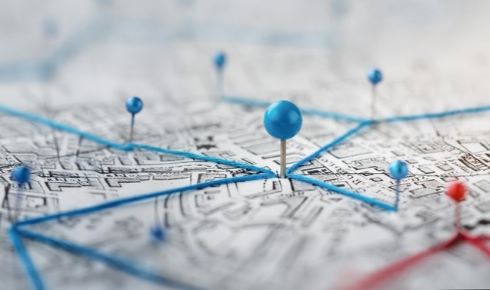
6th December 2024
Over the past decade, the RSB has helped fund travel for more than 100 early career biologists hoping to research, study or present abroad. With a new range of grants available, we asked the latest recipients how the funding supported their work
REBECCA BIGNOLD, ASTON UNIVERSITY, BIRMINGHAM
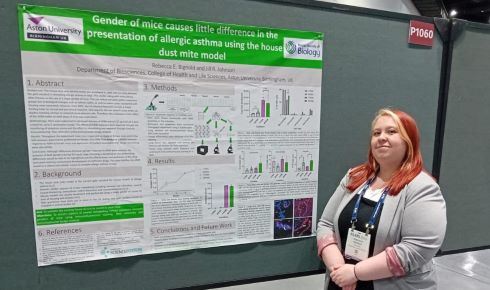
Attended the 12th Young Investigator’s Meeting on Airway Smooth Muscle and Lung Structure-Function (YIM). Winnipeg, Manitoba, Canada, 13-16 May 2024 and The American Thoracic Society Conference (ATS), San Diego, California, 19-23 May 2024
In May 2024, I was invited to attend two conferences in North America linked to my PhD and postdoctoral research in lung fibrosis and asthma.
At the YIM conference, I had been selected to give a presentation on research I developed involving a potential new drug for the treatment of allergic asthma. This was my first international talk and I received numerous thought-provoking questions and comments afterwards. I really enjoyed the format of the conference, and liked the emphasis on precision cut lung slicing, a technique for measuring lung function, as I am hoping to introduce this technique to my current lab.
After the meeting in Canada, I travelled to San Diego to attend ATS, the biggest lung conference in the world, with around 14,000 attendees. This huge conference allowed me to network with a variety of people, including representatives from GSK and NASA.
I had the opportunity to present a poster titled “Gender of mice causes little difference in the presentation of allergic asthma using the house dust mite model”, highlighting my recent comparison of the presentation of asthma in both male and female mice.
I particularly enjoyed seeing the progress being made in simulating lung microenvironments in 3D and new advances in elucidating macrophage communication in asthma. I attended events in the evenings, where I strengthened bonds forged at YIM and was able to confidently talk about my research with influential people. It was an emboldening experience that helped me believe my work can make a difference.
LILY WINKLER AMRSB,
UNIVERSITY COLLEGE, LONDON
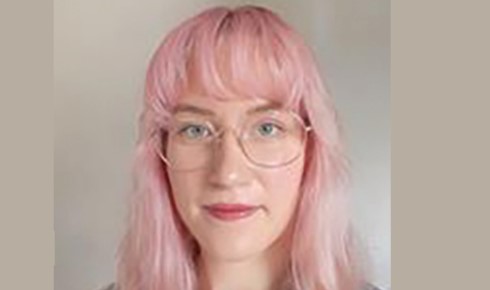
Attending and presenting at the International Astrocyte School (IAS), Bertinoro, Italy, April 2024
This one-week event was focused on the study of astrocytes, a type of non-neuronal nervous system cell. It comprised a variety of talks, which were often followed by animated discussions. These felt particularly valuable as the astrocyte research community is quite small.
Each student attending also did a seven-minute presentation on a recent or ongoing research project, followed by three minutes of questions from the audience. Mine was on ‘The effect of G-protein coupled oestrogen receptor activation on astrocyte calcium signalling’. Attendees also had to prepare for the ‘Agoras’ – group presentations and collective discussions where students propose bold, new ideas to tackle big questions in astrocyte research.
The week was taken up with many talks. My favourite was Professor Keith Murai showing us electron microscopy data visualising the ultra structure of astrocytes in a way I had never seen before. On the final day we held our Agora presentations. Discussions were technical and detailed without losing sight of the big picture. The IAS was not only a rigorous scientific exercise, but also a chance to develop a tight-knit community of young researchers. I am thankful to have had the opportunity to take part.
EMILY MAY STEVENSON MRSB,
UNIVERSITY OF EXETER AND PLYMOUTH MARINE LABORATORY
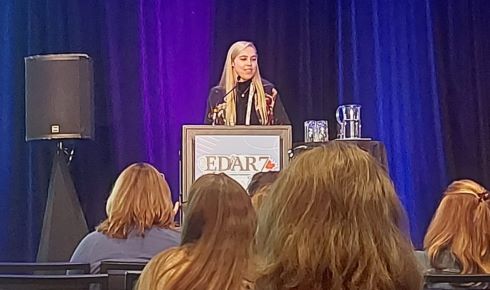
Environmental Dimension of Antimicrobial Resistance, Montreal, Canada, May 2024
This conference proved to be a significant milestone in my final year as a PhD student. I was able to present my research through a poster, titled “Selective colonisation of microplastics by antimicrobial resistant and pathogenic bacteria”, and I participated in a fun outreach event where academics acted as ‘human books,’ available for the public to ‘check out’ and discuss our research.
The event provided a unique platform to communicate my work to a broader audience and raise awareness of the critical issues of antimicrobial resistance and microplastics. One of the highlights was being asked to deliver the final address. I read a poem written during one of the workshops, which discussed the threats and connections between antimicrobial resistance and climate change. I was given the opportunity to discuss postdoctoral opportunities with potential mentors, paving the way for my future career in academia. The conference was a transformative experience for me and I look forward to applying the knowledge I gained.
DR ELIZABETH BEARBLOCK MRSB,
NOTTINGHAM UNIVERSITY HOSPITAL NHS TRUST
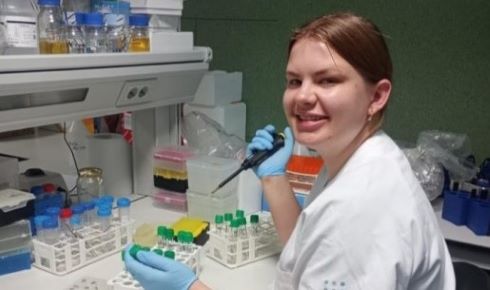
Experiment on corticosteroids and lung bacteria at the Fundació Institut d’Investigació Sanitària Illes Balears, Spain, July 2024
I am a clinical doctor enrolled in the Specialised Foundation Programme, which allows doctors in post-medical school training dedicated time for research. I wanted to study how inhaled corticosteroids are widely used to prevent abnormal inflammatory responses(exacerbations), although the treatment can promote chronic bacterial colonisation, including by Pseudomonas aeruginosa. P. aeruginosa colonisation then drives more frequent exacerbations.
My project aimed to investigate the effects of corticosteroids on quorum sensing in P. aeruginosa. After an initial run-through of the experiment, I quickly learned many key techniques, then it was time to set up the final experimental conditions. Dr Elena Jordana-Lluch talked me through this, and I soon had my calculations completed and my incubation plate mapped out. An anxious overnight wait was rewarded with a huge spreadsheet of data, which I was trained how to analyse. Much to my delight, the initial results fitted what we expected.
We spent the next few days fine-tuning the test before it was time for my return to the UK.I am continuing the work back in the Biodiscovery Institute at the University of Nottingham and will carryout the experiment chemically, complementing the knockouts of the other two quorum sensing pathways. This trip was invaluable in teaching me the skills I need to perform this work and I am grateful to everyone who made it possible.
PHILLIPA BATES AMRSB,
NOTTINGHAM TRENT UNIVERSITY
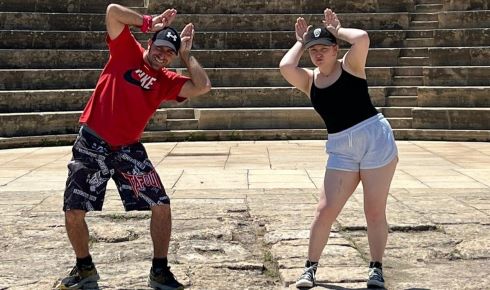
Field research and data collection for a master’s thesis on the diet of the red fox (Vulpes vulpes) in Cyprus, May 2024
I travelled to Cyprus to collect data for my master’s thesis, which aims to define the diet of the red fox (Vulpes vulpes), and how that diet impacts game, livestock and endangered species in the country.
While there, I analysed the contents of around 200 red fox stomachs collected by the Cyprus Game and Fauna Service (GFS) in 2023. This study is a part of a larger PhD project that aims to fill the current gaps in knowledge on the ecology of the red fox in Cyprus, which will be used to inform officials when making management decisions.
Stomach contents were split into categories and when items could not be identified down to at least class level, a sample was taken to enable them to be determined at a later stage. Mammal species have unique ‘scale patterns’ on their hairs, which can help identify them. As hair samples cannot be imported into the UK due to biosecurity measures, I took imprints of the patterns on microscope slides to take back to the UK for analysis.
I also assisted in some scat transects and camera trapping surveys, which will enable us to see how many red foxes inhabit the region and the types of prey available in the area. I want to continue to research carnivores in the future and so the fieldwork skills I gained, along with the chance to collaborate with other researchers and conservationists in person, will be extremely valuable.
INDIANA HOLT-MORRICE AMRSB,
UNIVERSITY OF PORTSMOUTH
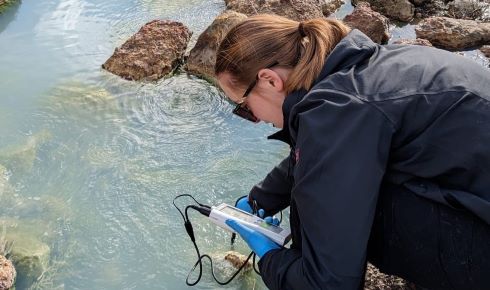
Sampling for a project focused on microbial degradation of plastics, using extremophiles from volcanic environments in Italy, April 2024
Certain species of bacteria and archaea have recently been shown to be able to degrade plastics and microplastics, but their capabilities are nowhere near sufficient to battle the quantities of plastic waste and pollution circulating in the environment today.
Thanks to an RSB travel grant, I collected samples from volcanic environments in Italy for my research project, ‘Metagenomic analysis and plastic biodegradation using extremophiles from volcanic environments’. I collected samples from a temperate sulfuric solfatara pool, a temperate bubbling pond and a temperate bubbling stream in Pomezia; then a warm fumarole in Naples, where I collected and stored soil for DNA analysis and microbial cultures back in the lab. Finally, I visited a hot natural spring outside Viterbo.
Back in Portsmouth, I have extracted DNA from 53 samples, which will be sequenced and microbial community composition determined. Selected samples will be examined for genes that encode for plastic degrading enzymes and these will be placed in flasks containing plastics to assess their degradation powers.
MICHELLE TAYLOR MRSB,
UNIVERSITY OF ABERDEEN
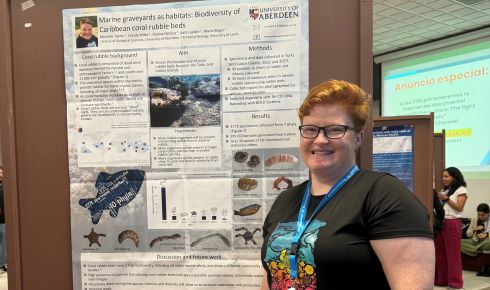
Training at the Natural History Museum of Los Angeles County, California, and the Mexican Coral Reef and Pan American Coral Reef Congress in Ensenada, Mexico, both in April 2024
Having collected over 2,800 specimens from Caribbean coral rubble beds, I reached out to taxonomy experts and was invited to the Natural History Museum of Los Angeles County for training in identification techniques. Our identifications were then used to cross reference with the genetic data I had generated, which is housed in the global open-access Barcode of Life Database.
After that I travelled to the congress in Ensenada. Conference topics ranged from transcriptomics and depth gradient speciation to coral reef conservation and the effect of seabirds on reef fishes. We also had an activity day, where I chose diving and was lucky enough to see four different whale species.
Then it was my turn to present my research. People were interested in my project, and I left the poster session with contact details for several fellow researchers who I am excited to collaborate with.
ELENA HARTMANN AMRSB,
UNIVERSITY OF EDINBURGH
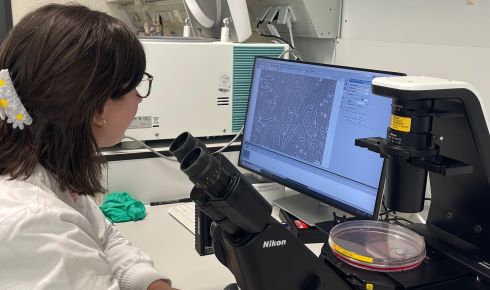
Training on in vitro culture at the Robert Koch-Institut, Berlin, Germany, May 2024
Approximately a third of the global population is infected with the parasite Toxoplasma gondii. My PhD focuses on host-pathogen interactions during the chronic stage of infection, and thanks to an RSB grant I was able to travel to Berlin to learn valuable new lab skills and attend a conference related to my research.
At the Blume research group, I learned skills that will be valuable for the CRISPR-Cas9-based genetic screen I will perform on Toxoplasma-infected skeletal muscle cells. I also had the opportunity to attend the 17th International Congress on Toxoplasmosis, where I talked about my work with leading members of the community. I am now really looking forward to implementing everything I have learned.
.


